Bear, Greg - The Venging
VIP免费
2024-12-11
1
0
453.39KB
197 页
5.9玖币
侵权投诉
The Venging
The Venging
Greg Bear
An [e - reads ] Book
No part of this publication may be reproduced or transmitted in any form or by any means, electronic, or mechanical, including photocopy, recording, scanning or any information
storage retrieval system, without explicit permission in writing from the Author.
This book is a work of fiction. Names, characters, places, and incidents are products of the author's imagination or are used fictitiously. Any resemblance to actual events or locals or
persons, living or dead, is entirely coincidental.
Copyright 1983 by Greg Bear
First e-reads publication 1999
www.e-reads.com
ISBN 0-7592-0076-9
Author Biography
Greg Bear's stories and novels have won him an important place in the science fiction community.
Initially, Bear was an illustrator for SF novels in the 1970's. He has since gone on to a prolific writing
career. His short story, Blood Music, which he later rewrote as a novel, won him both the Hugo and
Nebula Awards. His acclaimed work includes DINOSAUR SUMMER, ANVIL OF STARS, ETERNITY
and DARWIN'S RADIO. He is married and lives in Washington State.
Preface
I have had a passion for science fiction and fantasy ever since I can remember. Science fiction has been a
wonderful mother for my mind, showing me that the world is far bigger and stranger than it seems within
my province. And in the past few years—after many more years of apprenticeship—it has become a fine,
broad landscape on which to test my imagination.
Occasionally I've felt the pressure of limited editors and markets, but I have yet to run up against an
artistic boundary. If a thought is expressible in human language, a science fiction story can be written
about it. The same cannot be said of any other genre.
Through reading science fiction, I became interested in other forms of literature, in astronomy and the
sciences, in history and philosophy. Specifically, discovering James Blish'sCase of Conscience when I
was sixteen led me to read James Joyce; L. Sprague de Camp, Fletcher Pratt, Poul Anderson, and others
have given me solid reasons to explore history. Arthur C. Clarke—and through Clarke, Olaf
Stapledon—sent me on a wild search through philosophy, looking for similar insights and experiences.
(I've usually been disappointed; Stapledon is unique.) In short, my intellect has been nurtured and guided
file:///G|/Program%20Files/eMule/Incoming/TheVenging.html (1 of 197) [1/19/2005 12:38:19 AM]
The Venging
by science fiction.
Some people, reading the above, will sneer the ineradicable sneer. The hell with them. C. P. Snow pinned
their little grey moth inThe Two Cultures and the Scientific Revolution; they are ignorant or afraid of
science. They reject the universe in favor of a small human circle, limited in time and place to their own
lifetimes. You are not one of them if you have read this far. You are one of the brave ones.
So I will open my heart to you a little bit and talk about the stories that follow.
I have friends who believe the world will come to an end in twenty or thirty years. They foresee complete
collapse, perhaps nuclear war. They look on the prospect with either stunned indifference or some relish.
Serve everybody right, they seem to say.
What they are actually saying is that within the next few decades—certainly within the next sixty or
seventy years—theywill come to an end.Their world will darken. And, solipsists that many of us are, it
seems perfectly logical to take everybody and everything with us. The future does not really exist,
certainly not the far and unknowable future. Why talk about it?
They are still my friends, but they are as wrong as wrong can be. The future will come, and it will be
different, unimaginably so. Then why do I bother to try imagining it?
I could sing you a long number on how science fiction is seldom intended to be prophetic. But I'm willing
to bet, in our deepest hearts, that we all hope one of our more optimistic imagined futures, or some aspect
of a literary time to come, will closely parallel reality. Then we will be admired for our perspicacity.
People in the future, if they still read, might come across an even more fantastic concept and say, "Hey,
that crazy Greg Bear stuff!"
Perhaps. But it will be accident, not prophecy.
Like my pessimistic friends, I'm not going to live forever. I may see the first starships; I may not.
But when I write, I not only live to see one future, I experience dozens. I chart their courses, lay out
histories, try to create new cultures and extend the range of discovery. When I write—
When I write, I'm immortal.
Sometimes I enter into a kind of trance state and engage so many thoughts and ideas and abilities that I
seem to rise onto another plane. And though I seldom think about it while I'm on that plane, I seem to
become everyone who has ever thought about the future. I join the greats, past and present, at least for a
moment.
I've been writing since I was eight or nine years old. In 1966, when I was fifteen, through something of a
file:///G|/Program%20Files/eMule/Incoming/TheVenging.html (2 of 197) [1/19/2005 12:38:19 AM]
The Venging
fluke I sold my first professional short story. Five years passed before I sold another. The apprenticeship
is still not over, and may never be. None of those earlier efforts are represented in this collection; the
earliest piece here, "Mandala," was written in 1975 and first appeared in 1978. It also comprises the first
third of my novel,Strength of Stones, published in 1981.
There isn't much remarkable to record about the writing of these stories. Writing is usually quite dull to an
outside observer. It consists of long periods of apparent loafing around, punctuated by hours at a
typewriter, highlighted by moments of desk-pounding and finger-chewing puzzlement. (All this, to
contrast with the above-mentioned trance state.)
"Mandala" and "Hardfought" were about equally difficult to write, for different reasons. "The White
Horse Child" was one of the easiest; like "Scattershot," it emerged while I sat at the typewriter,
consciously unaware of what was going to pour out. "Petra" went through several stages, becoming
progressively stranger and stranger. (One of the great difficulties with creativity is trying to impose order
on the results.)
"The Wind from a Burning Woman" also began as an exercise in sitting blankly at the typewriter. As in
most instances where such stories turn out well, there was a strong emotion lurking behind the apparent
blankness—that of repugnance to terrorism. Do the weak have the fight to force the strong to do their
bidding by terrorist action? To handle the issue honestly, I had to make the "Burning Woman" fight for a
cause that I, myself, would cherish. One editor, reading the story for an anthology on space colonies,
rejected it because it didn't overtly support the cause. It would have been dishonest to force the story into
such a mold; however pleasant or unpleasant the result, my stories must work themselves out within their
own framework, not according to some market principle or philosophical bias.
It may be remarkable that, with such views, I've come as far as I have in publishing, where large
conglomerates seem to dictate overall marketing of science fiction as if it were some piecework
commodity. ("Take dragon/unicorn/spaceship, add vaguely medieval/magical setting, mix well with wise
old wizard/cute sidekick …") Don't get me wrong, I've enjoyed stories with all those elements, but
enough is enough. Science fiction is much too restless to accept the same kind of genre regimentation
displayed by, for example, Westerns or hard-boiled detective novels, where one Western Town or corrupt
Big City can serve as stage settings for an infinity of retold tales.
But enough authorial interference. I will tell you no more about these stories until we meet in person;
perhaps not even then, for I'm not certain my interpretations are always correct. "Mandala," for example,
has defied my analysis for seven years, and yet I knew what I wanted to say when I wrote it.
That's when I'm happiest with my own work—when the stories say so many things that they become
playgrounds for the mind. I hope you feel the same way.
GREGBEAR
Spring Valley, California
file:///G|/Program%20Files/eMule/Incoming/TheVenging.html (3 of 197) [1/19/2005 12:38:19 AM]
The Venging
For David Clark
Contents
The Wind from a Burning Woman
The White Horse Child
Petra
Scattershot
Mandala
Hardfought
The Venging
The Wind from a Burning Woman
Five years later the glass bubbles were intact, the wires and pipes were taut, and the city—strong across
Psyche's surface like a dewy spider's web wrapped around a thrown rock—was still breathtaking. It was
also empty. Hexamon investigators had swept out the final dried husks and bones. The asteroid was clean
again. The plague was over.
Giani Turco turned her eyes away from the port and looked at the displays. Satisfied by the approach, she
ordered a meal and put her work schedule through the processor for tightening and trimming. She had six
tanks of air, enough to last her three days. There was no time to spare. The robot guards in orbit around
Psyche hadn't been operating for at least a year and wouldn't offer any resistance, but four small pursuit
bugs had been planted in the bubbles. They turned themselves off whenever possible, but her presence
would activate them. Time spent in avoiding and finally destroying them: one hour forty minutes, the
processor said. The final schedule was projected in front of her by a pen hooked around her ear. She
happened to be staring at Psyche when the readout began; the effect—red numerals and letters over grey
rock and black space—was pleasingly graphic, like a film in training.
Turco had dropped out of training six weeks early. She had no need for a final certificate, approval from
the Hexamon, or any other nicety. Her craft was stolen from Earth orbit, her papers and cards forged, and
her intentions entirely opposed to those of the sixteen corporeal desks. On Earth, some hours hence, she
file:///G|/Program%20Files/eMule/Incoming/TheVenging.html (4 of 197) [1/19/2005 12:38:19 AM]
The Venging
would be hated and reviled.
The impulse to sneer was strong—pure theatrics, since she was alone—but she didn't allow it to break her
concentration. (Worse than sheep, the seekers-after-security, the cowardly citizens who tacitly supported
the forces that had driven her father to suicide and murdered her grandfather; the seekers-after-security
who lived by technology but believed in the just influences: Star, Logos, Fate, and Pneuma…)
To calm her nerves, she sang a short song while she selected her landing site.
The ship, a small orbital tug, touched the asteroid like a mote settling on a boulder and made itself fast.
She stuck her arms and legs into the suit receptacles, and the limb covers automatically hooked
themselves to the thorax. The cabin was too cramped to get into a suit any other way. She reached up and
brought down the helmet, pushed until all the semifluid seals seized and beeped, and began the evacuation
of the cabin's atmosphere. Then the cabin parted down the middle, and she floated slowly, fell more
slowly still, to Psyche's surface.
She turned once to watch the cabin clamp together and to see if the propulsion rods behind the tanks had
been damaged by the unusually long journey. They'd held up well.
She took hold of a guide wire after a flight of twenty or twenty-five meters and pulled for the nearest
glass bubble. Five years before, the milky spheres had been filled with the families of workers setting the
charges that would form Psyche's seven internal chambers. Holes had been bored from the Vlasseg and
Janacki poles, on the narrow ends of the huge rock, through the center. After the formation of the
chambers, materials necessary for atmosphere would have been pumped into Psyche through the
boreholes while motors increased her natural spin to create artificial gravity inside.
In twenty years, Psyche's seven chambers would have been green and beautiful, filled with hope—and
passengers. But now the control-bubble hatches had been sealed by the last of the investigators. Since
Psyche was not easily accessible, even in its lunar orbit, the seals hadn't been applied carefully.
Nevertheless, it took her an hour to break in. The glass ball towered above her, a hundred feet in diameter,
translucent walls mottled by the shadows of rooms and equipment. Psyche rotated once every three hours,
and light from the sun was beginning to flush the tops of the bubbles in the local cluster. Moonlight
illuminated the shadows. She pushed the rubbery cement seals away, watching them float lazily to the
pocked ground. Then she examined the airlock to see if it was still functioning. She wanted to keep the
atmosphere inside the bubble, to check it for psychotropic chemicals; she would not leave her suit at any
rate.
The locked door opened with a few jerks and closed behind her. She brushed crystals of frost off her
faceplate and the inner lock door's port. Then she pushed the button for the inner door, but nothing
happened. The external doors were on a different power supply, which was no longer functioning—or,
she hoped, had only been turned off.
file:///G|/Program%20Files/eMule/Incoming/TheVenging.html (5 of 197) [1/19/2005 12:38:19 AM]
The Venging
From her backpack she removed a half-meter pry bar. The break-in took another fifteen minutes. She was
now five minutes ahead of schedule.
Across the valley, the fusion power plants that supplied power to the Geshel populations of Tijuana and
Chula Vista sat like squat mountains of concrete. By Naderite law, all nuclear facilities were enclosed by
multiple domes and pyramids, whether they posed any danger or not. The symbolism was two-fold—it
showed the distaste of the ruling Naderites for energy sources that were not nature-kinetic, and it carried
on the separation of Naderites-Geshels. Farmer Kollert, advisor to the North American Hexamon and
ecumentalist to the California corporeal desk, watched the sun set behind the false peak and wondered
vaguely if there was any symbolism in the act. Was not fusion the source of power for the sun? He
smiled. Such things seldom occurred to him; perhaps it would amuse a Geshel technician.
His team of five Geshel scientists would tour the plants two days from now and make their report to him.
He would then pass onhis report to the desk, acting as interface for the invariably clumsy, elitist language
the Geshel scientist used. In this way, through the medium of advisors across the globe, the Naderites
oversaw the production of Geshel power. By their grants and control of capital, his people had once
plucked the world from technological overkill, and the battle was ongoing still—a war against some of
mankind's darker tendencies.
He finished his evening juice and took a package of writing utensils from the drawer in the veranda desk.
The reports from last month's energy consumption balancing needed to be edited and revised, based on
new estimates—and he enjoyed doing the work himself, rather than giving it to the library computer
persona. It relaxed him to do things by hand. He wrote on a positive feedback slate, his scrawly letters
adjusting automatically into script, with his tongue between his lips and a pleased frown creasing his
brow.
"Excuse me, Farmer." His ur-wife, Gestina, stood in the French doors leading to the veranda. She was as
slender as when he had married her, despite fifteen years and two children.
"Yes, cara, what is it?" He withdrew his tongue and told the slate to store what he'd written.
"Josef Krupkin."
Kollert stood up quickly, knocking the metal chair over. He hurried past his wife into the dining room,
dropped his bulk into a chair, and drew up the crystalline cube on the alabaster tabletop. The cube
adjusted its picture to meet the angle of his eyes, and Krupkin appeared.
"Josef! This is unexpected."
"Very," Krupkin said. He was a small man with narrow eyes and curly black hair. Compared to Kollert's
bulk, he was dapper—but thirty years behind a desk had given him the usual physique of a Hexamon
backroomer. "Have you ever heard of Giani Turco?"
file:///G|/Program%20Files/eMule/Incoming/TheVenging.html (6 of 197) [1/19/2005 12:38:19 AM]
The Venging
Kollert thought for a moment. "No, I haven't. Wait—Turco. Related to Kimon Turco?"
"Daughter. California should keep better track of its radical Geshels, shouldn't it?"
"Kimon Turco lived on the Moon."
"His daughter lived in your district."
"Yes, fine. What about her?" Kollert was beginning to be perturbed. Krupkin enjoyed roundabouts even in
important situations—and to call him at this address, at such a time, something important had happened.
"She's calling for you. She'll only talk to you, none of the rest. She won't even accept President Praetori."
"Yes. Who is she? What has she done?"
"She's managed to start up Psyche. There was enough reaction mass left in the Beckmann motors to alter
it into an Earth-intersect orbit." The left side of the cube was flashing bright red, indicating the call was
being scrambled.
Kollert sat very still for a few seconds. There was no need acting incredulous. Krupkin was in no position
to joke. But the enormity of what he said—and the impulse to disbelieve, despite the bearer of the
news—froze Kollert for an unusually long time. He ran his hand through lank blond hair.
"Kollert," Krupkin said. "You look like you've been—"
"Is she telling the truth?"
Krupkin shook his head. "No, Kollert, you don't understand. She hasn't claimed these accomplishments.
She hasn't said anything about them yet. She just wants to speak to you. But our tracking stations say
there's no doubt. I've spoken with the officer who commanded the last inspection. He says there was
enough mass left in the Beckmann drive positioning motors to push—"
"This is incredible! No precautions were taken? The mass wasn't drained, or something?"
"I'm no Geshel, Farmer. My technicians tell me the mass was left on Psyche because it would have cost
several hundred million—"
"That's behind us now. Let the journalists worry about that, if they ever hear of it." He looked up and saw
Gestina still standing in the French doors. He held up his hand to tell her to stay where she was. She was
going to have to keep to the house, incommunicado, for as long as it took to straighten this out.
file:///G|/Program%20Files/eMule/Incoming/TheVenging.html (7 of 197) [1/19/2005 12:38:19 AM]
The Venging
"You're coming?"
"Which center?"
"Does it matter? She's not being discreet. Her message is hitting an entire hemisphere, and there are
hundreds of listening stations to pick it up. Several aren't under our control. Once anyone pinpoints the
source, the story is going to be clear. For your convenience, go to Baja Station. Mexico is signatory to all
the necessary pacts."
"I'm leaving now," Kollert said. Krupkin nodded, and the cube went blank.
"What was he talking about?" Gestina asked. "What'sPsyche ?''
"A chunk of rock, dear," he said. Her talents lay in other directions—she wasn't stupid. Even for a
Naderite, however, she was unknowledgeable about things beyond the Earth.
He started to plan the rules for her movements, then thought better of it and said nothing. If Krupkin was
correct—and he would be—there was no need. The political considerations, if everything turned out right,
would be enormous. He could run as Governor of the Desk, even President of the Hexamon…
And if everything didn't turn out right, it wouldn't matter where anybody was.
Turco sat in the middle of her grandfather's control center and cried. She was tired and sick at heart.
Things were moving rapidly now, and she wondered just how sane she was. In a few hours she would be
the worst menace the Earth had ever known, and for what cause? Truth, justice? They had murdered her
grandfather, discredited her father and driven him to suicide—but all seven billion of them, Geshels and
Naderites alike?
She didn't know whether she was bluffing or not. Psyche's fall was still controllable, and she was
bargaining it would never hit the Earth. Even if she lost and everything was hopeless, she might divert it,
causing a few tidal disruptions, minor earthquakes perhaps, but still passing over four thousand kilometers
from the Earth's surface. There was enough reaction mass in the positioning motors to allow a broad
margin of safety.
Resting lightly on the table in front of her was a chart that showed the basic plan of the asteroid. The
positioning motors surrounded a crater at one end of the egg-shaped chunk of nickel-iron and rock.
Catapults loaded with huge barrels of reaction mass had just a few hours earlier launched a salvo to
rendezvous above the crater's center. Beckmann drive beams had then surrounded the mass with a halo of
energy, releasing its atoms from the bonds of nature's weak force. The blast had bounced off the crater
floor, directed by the geometric patterns of heat-resistant slag. At the opposite end, a smaller guidance
engine was in position, but it was no longer functional and didn't figure in her plans. The two tunnels that
reached from the poles to the center of Psyche opened into seven blast chambers, each containing a fusion
file:///G|/Program%20Files/eMule/Incoming/TheVenging.html (8 of 197) [1/19/2005 12:38:19 AM]
The Venging
charge. She hadn't checked to see if the charges were still armed. There were so many things to do.
She sat with her head bowed, still suited up. Though the bubbles contained enough atmosphere to support
her, she had no intention of unsuiting. In one gloved hand she clutched a small ampoule with a nozzle for
attachment to air and water systems piping. The Hexamon Nexus's trumped-up excuse of madness caused
by near-weightless conditions was now a shattered, horrible lie. Turco didn't know why, but the Psyche
project had been deliberately sabotaged, and the psychotropic drugs still lingered.
Her grandfather hadn't gone mad contemplating the stars. The asteroid crew hadn't mutinied out of
misguided Geshel zeal and space sickness.
Her anger rose again, and the tears stopped. "You deserve whoever governs you," she said quietly.
"Everyone is responsible for the actions of their leaders."
The computer display cross-haired the point of impact. It was ironic—the buildings of the Hexamon
Nexus were only sixty kilometers from the zero point. She had no control over such niceties, but nature
and fate seemed to be as angry as she was.
"Moving an asteroid is like carving a diamond," the Geshel advisor said. Kollert nodded his head, not
very interested. "The charges for initial orbit change—moving it out of the asteroid belt—have to be
placed very carefully or the mass will break up and be useless. When the asteroid is close enough to the
Earth-Moon system to meet the major crew vessels, the work has only begun. Positioning motors have to
be built—"
"Madness," Kollert's secretary said, not pausing from his monitoring of communications between
associate committees.
"And charge tunnels drilled. All of this was completed on the asteroid ten years ago."
"Are the charges still in place?" Kollert asked.
"So far as I know," the Geshel said.
"Can they be set off now?"
"I don't know. Whoever oversaw dismantling should have disarmed to protect his crew—but then, the
reaction mass should have been jettisoned, too. So who can say? The report hasn't cleared top secrecy
yet."
And not likely to, either, Kollert thought. "If they haven't been disarmed, can they be set off now? What
would happen if they were?"
file:///G|/Program%20Files/eMule/Incoming/TheVenging.html (9 of 197) [1/19/2005 12:38:19 AM]
The Venging
"Each charge has a complex communications system. They were designed to be set off by coded signals
and could probably be set off now, yes, if we had the codes. Of course, those are top secret, too."
"What would happen?" Kollert was becoming impatient with the Geshel.
"I don't think the charges were ever given a final adjustment. It all depends on how well the initial
alignment was performed. If they're out of tune, or the final geological studies weren't taken into account,
they could blow Psyche to pieces. If they are true, they'll do what they were intended to do—form
chambers inside the rock. Each chamber would be about fifteen kilometers long, ten kilometers in
diameter—"
"If the asteroid were blown apart, how would that affect our situation?"
"Instead of having one mass hit, we'd have a cloud, with debris twenty to thirty kilometers across and
smaller."
"Would that be any better?" Kollert asked.
"Sir?"
"Would it be better to be hit by such a cloud than one chunk?"
"I don't think so. The difference is pretty moot—either way, the surface of the Earth would be radically
altered, and few life forms would survive."
Kollert turned to his secretary. "Tell them to put a transmission through to Giani Turco."
The communications were arranged. In the meantime Kollert tried to make some sense out of the Geshel
advisor's figures. He was very good at mathematics, but in the past sixty years many physics and
chemistry symbols had diverged from those used in biology and psychology. To Kollert, the Geshel
mathematics was irritatingly dense and obtuse.
He put the paper aside when Turco appeared on the cube in front of him. A few background beeps and
noise were eliminated, and her image cleared. "Set Turco," he said.
"Ser Farmer Kollert," she replied several seconds later. A beep signaled the end of one side's
transmission. She sounded tired.
"You're doing a very foolish thing."
"I have a list of demands," she said.
file:///G|/Program%20Files/eMule/Incoming/TheVenging.html (10 of 197) [1/19/2005 12:38:19 AM]
摘要:
展开>>
收起<<
TheVengingTheVengingGregBearAn[e-reads]BookNopartofthispublicationmaybereproducedortransmittedinanyformorbyanymeans,electronic,ormechanical,includingphotocopy,recording,scanningoranyinformationstorageretrievalsystem,withoutexplicitpermissioninwritingfromtheAuthor.Thisbookisaworkoffiction.Names,cha...
声明:本站为文档C2C交易模式,即用户上传的文档直接被用户下载,本站只是中间服务平台,本站所有文档下载所得的收益归上传人(含作者)所有。玖贝云文库仅提供信息存储空间,仅对用户上传内容的表现方式做保护处理,对上载内容本身不做任何修改或编辑。若文档所含内容侵犯了您的版权或隐私,请立即通知玖贝云文库,我们立即给予删除!
相关推荐
-
.net笔试题选择题集VIP免费
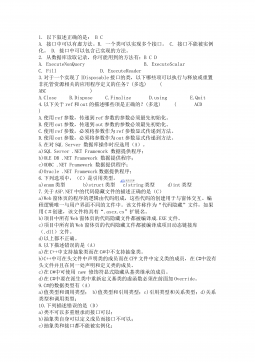
 2024-11-14 29
2024-11-14 29 -
产品需求文档 - 适合敏捷迭代开发的PRD文档应该怎么写VIP免费

 2024-11-23 5
2024-11-23 5 -
产品需求文档 - 面向产品需求的验证管理VIP免费
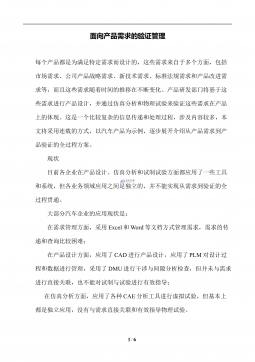
 2024-11-23 4
2024-11-23 4 -
产品需求文档 - 没有标准,只有沟通VIP免费
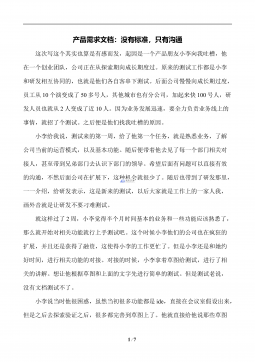
 2024-11-23 4
2024-11-23 4 -
产品需求文档 - 产品需求应该怎么写VIP免费
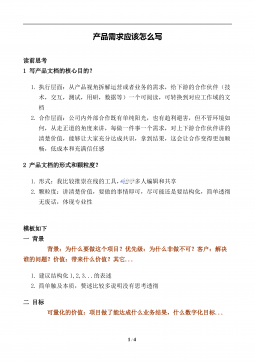
 2024-11-23 5
2024-11-23 5 -
产品需求文档 - 产品需求文档 PRD模板VIP免费

 2024-11-23 33
2024-11-23 33 -
产品需求文档 - 产品需求核心组件分析VIP免费
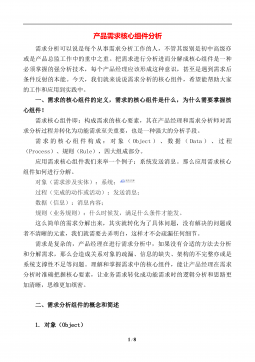
 2024-11-23 45
2024-11-23 45 -
2024版.新高考版.高考总复习.数学.5·3A版1_1集合VIP免费

 2024-11-23 29
2024-11-23 29 -
2024版.新高考版.高考总复习.数学.5·3A版1_1集合(分层集训)VIP免费

 2024-11-23 16
2024-11-23 16 -
产品需求文档 - 产品技能树之需求分析(一)VIP免费

 2024-11-23 9
2024-11-23 9
分类:外语学习
价格:5.9玖币
属性:197 页
大小:453.39KB
格式:PDF
时间:2024-12-11







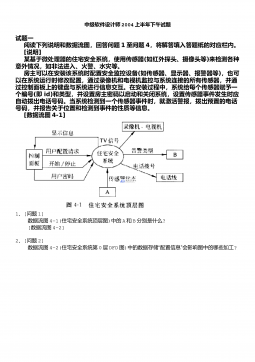
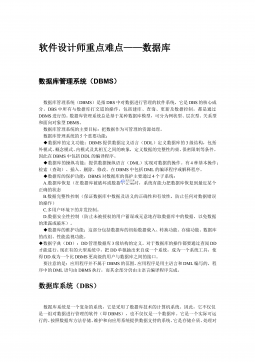
 渝公网安备50010702506394
渝公网安备50010702506394
